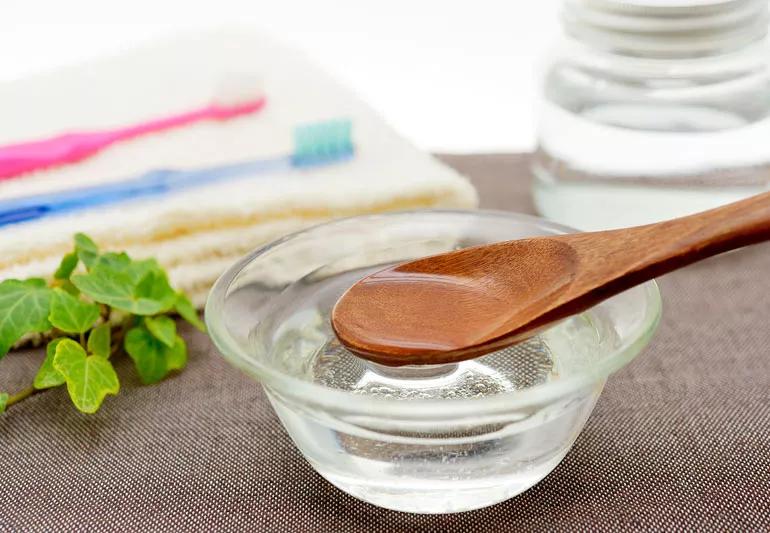Oil pulling can help prevent plaque and preserve your gums, but it can’t cure ailments

Image content: This image is available to view online.
View image online (https://assets.clevelandclinic.org/transform/63e41318-ea89-4c0b-b306-c0dc44d4ccdc/oilPullingOralCare-829436380-770x533-1_jpg)
oil pulling oral care
With endorsements coming from celebrities like Gwyneth Paltrow and the Olsen twins, you might find it tempting to try oil pulling, a centuries-old Indian practice that’s gained lots of attention in wellness circles in recent years.
Advertisement
Cleveland Clinic is a non-profit academic medical center. Advertising on our site helps support our mission. We do not endorse non-Cleveland Clinic products or services. Policy
For centuries, people used this practice every day to prevent tooth decay, bad breath, bleeding gums, throat dryness and cracked lips. Enthusiastic proponents of modern oil pulling claim it cures everything from hangovers and diabetes to acne.
So, what’s true, what’s false, and what’s all of that oil doing to your teeth?
Oil pulling involves swishing a teaspoon of oil in your mouth for 20 minutes every day, then spitting it out. The traditional Ayurvedic method calls for sesame oil, but many contemporary oil pullers prefer coconut.
While less popular now than it was a few years ago, social media influencers still extoll the practice’s purported health benefits. But the evidence-based bottom line on oil pulling is this: Oil pulling can’t substitute for brushing twice a day and flossing.
In fact, there’s no evidence that oil pulling actually cures anything. But wait! While the practice was undeniably overhyped over the past several years, it does appear to have a few benefits.
Oil pulling may not be a cure-all, but it’s not a joke either. In fact, the practice may end up occupying a unique place in the world of oral hygiene. According to a 2017 study, oil pulling could be a useful preventive home therapy for maintaining oral hygiene — especially in developing countries with limited access to products like mouthwash.
Advertisement
That’s because, as another 2017 study found, when done correctly and regularly (and in concert with brushing and flossing), oil pulling can actually improve your oral hygiene.
There’s some evidence that oil pulling, particularly with coconut oil, could inhibit plaque formation, says wellness and preventative medicine specialist Sandra Darling, DO. That evidence derives, in part, from a 2020 study.
And a 2008 study found that oil pulling is as effective as rinsing with mouthwash to maintain and improve oral health. The study examined levels of Streptococcus mutans, a bacteria commonly found in the mouth that causes tooth decay.
Oil pulling reduces gingivitis — a mild, early form of gum disease — according to both the aforementioned 2020 study, and an earlier study from 2009.
Again, it’s important to restate that oil pulling shouldn’t take the place of good, consistent dental hygiene, Dr. Darling says. That means brushing twice a day for two minutes and flossing one to two times daily.
Oil pulling isn’t going to whiten your teeth, clear your sinuses or cure your diabetes, despite what advocates claim.
“There is no research to support all of these other health claims,” Dr. Darling notes.
“You can make the stretch that oral health can support systemic health — that there are benefits downstream,” she adds, “but to date, there is no scientific research that oil pulling is a direct mechanism of action for these other conditions. And no current evidence suggests that improving oral hygiene alone will improve diabetes or other chronic conditions.”
If you want to give the practice a try, take these steps:
If you’re trying to decide whether or not to add oil pulling to your daily oral hygiene routine, ask yourself these questions:
Advertisement
Long story short: If oil pulling makes you happy, pull away! It’s certainly not going to hurt you.
Advertisement

Delivered every Tuesday!
Sign up for our Health Essentials emails for expert guidance on nutrition, fitness, sleep, skin care and more
It's a letter about the news!

Every two weeks once
Sign up for our Health Essentials emails for expert guidance on nutrition, fitness, sleep, skin care and more.
Learn more about our editorial process.
Advertisement
Benefits typically include bi-annual screenings and lower payments on procedures like fillings and crowns
Once you see that first tooth, it’s time to start brushing
Your teeth and gums have a huge role to play in other, more systemic health conditions
Find out which viruses and bacteria can become someone else's problem
Estrogen and progesterone changes throughout the month — and throughout your life — can make you more prone to dental health concerns
This tool is an add-on to your regular brushing and flossing habits, not a replacement for them
Your toothbrush can’t reach the area where your teeth meet your gum line
Most recommended precautions center around minimizing bruising or swelling
Type 2 diabetes isn’t inevitable with these dietary changes
Applying a hot or cold compress can help with pain
Pump up your iron intake with foods like tuna, tofu and turkey